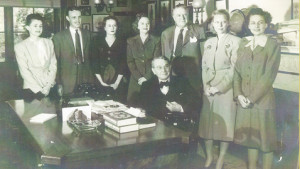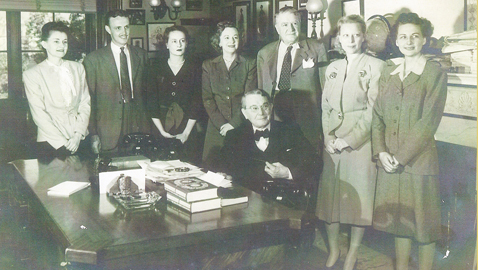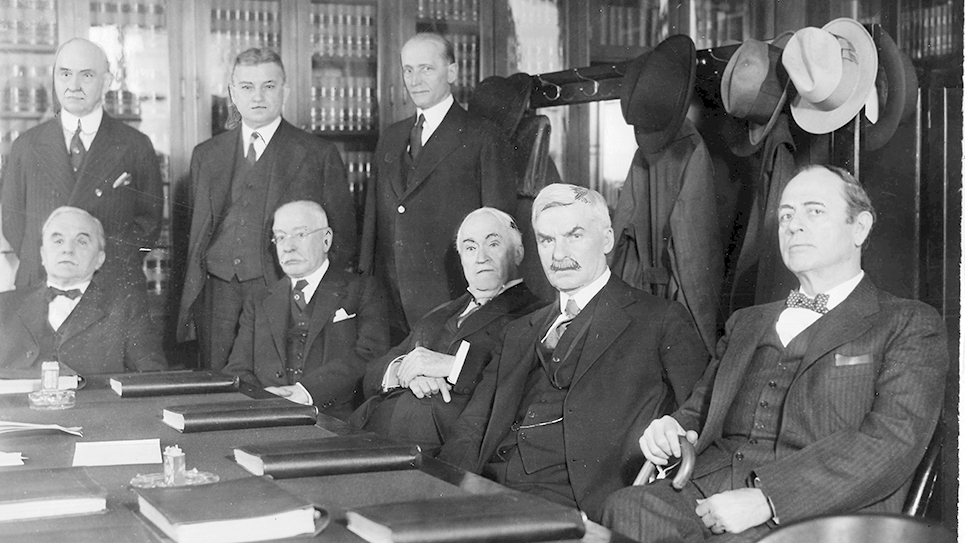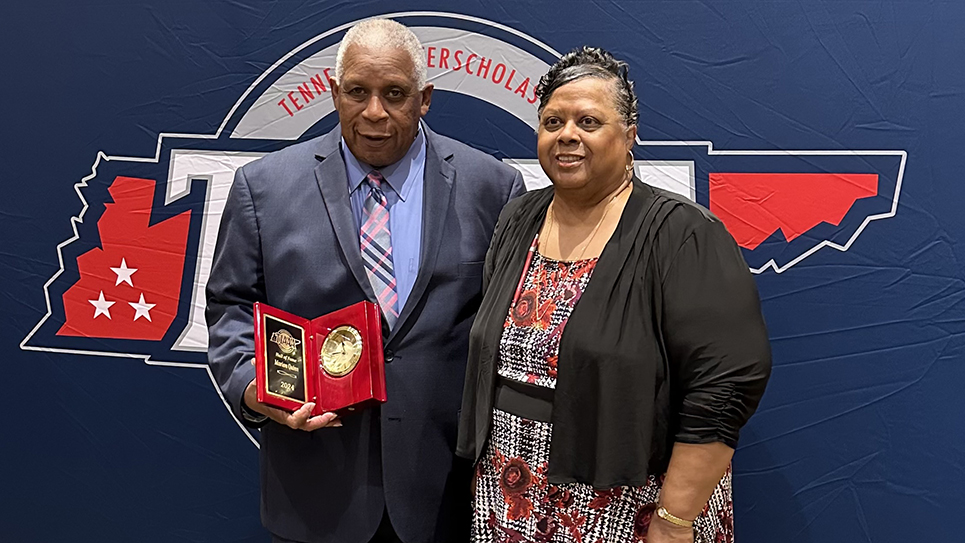
Senator McKellar and his staff circa 1943. Don McKellar is standing just behind his brother, Senator McKellar, and Janice McKellar is standing by her husband’s right side. Photo from author’s archives.
Tennessee’s longest serving United States Senator, Kenneth D. McKellar, employed several secretaries during his thirty-six years as a member of the nation’s upper chamber. For sixteen years, Senator McKellar’s secretary was his youngest brother, Donald White McKellar. A “secretary” to a member of the Senate at that time would be the equivalent to a Chief of Staff in today’s parlance.
When K. D. McKellar first went to the Senate in 1917, he took Lonnie B. Ormes with him as his secretary. L. B. Ormes had managed McKellar’s successful senate race in 1916. It was a common practice at the time for a Congressman or Senator to employ his campaign manager as his secretary, as the secretary would need to have a thorough understanding of the state or district and its residents. A knowledge of the leading citizens and dynamics of the state or district certainly didn’t hurt either.
Lonnie Ormes returned to Tennessee where he served as Clerk of the Federal District Court for Middle Tennessee, an appointment secured for him by Senator McKellar. Senator McKellar then employed a woman, Miss Sue Shelton White, as his Secretary. For that time, it was extremely rare for a member of the United States Senate to have a female Chief of Staff. McKellar was a strong proponent of giving women the right to vote and Sue Shelton White was a very active suffragette. Ms. White was, not surprisingly, an accomplished woman and eventually earned a law degree at a time when very few women were practicing attorneys.
Miss White joined Senator McKellar in actively lobbying the Tennessee General Assembly when the legislature was the pivotal state in ratifying the Nineteenth Amendment to the Constitution. Certainly Miss White would not have been such an outspoken suffragist without McKellar’s approval.
Sue Shelton White remained as McKellar’s secretary until the Senator decided to employ his younger brother, D. W. McKellar. The McKellar clan was a large one and “Don” McKellar was the youngest of the McKellar siblings. James McKellar, the patriarch of the family, had died when Don was only seven or eight years old and his older brothers and sisters helped to rear him. Miss White was naturally quite unhappy when she learned that Senator McKellar intended to hire his younger brother as his Secretary. McKellar tried hard to pacify Miss White, even offering to make up the difference in her salary from his own pocket. Miss White did not relish the notion of taking the “second place” in the McKellar office and left the Senator’s employ, although McKellar helped her secure employment then and later. Sue Shelton White eventually found a well-paying position in the New Deal, a position she secured with McKellar’s assistance.
Don was quite different in both personality and appearance from his older brother, K. D. Don was over six feet tall and quite handsome, especially when younger. Senator McKellar, while a very courtly man, had a quick temper and was quite straight-laced. The Senator was a teetotaler, having seen the devastating effects of alcohol on a family member, perhaps his own father. Don had no similar compunction about alcohol and enjoyed having a drink; in fact, he may having enjoyed adult beverages a little too well.
Don McKellar was a convivial person and liked people and people liked Don as well. Don had married Elise Donelson, fathered three daughters and gone into business and was living in New York City when Senator McKellar summoned him to serve as his Secretary. Don’s marriage was apparently not successful and those who recall his wife remember her as a very difficult woman. Don’s business had failed and Senator McKellar was naturally concerned about his younger brother.
When Senator McKellar decided Don would serve as his Secretary, his baby brother did not like the idea at all. It became a contest of wills and the McKellars could be stubborn to the point to make a mule seem capricious, but K. D. himself had the tenacity of a terrier worrying a bone and could be positively relentless when he had a notion. Don, exasperated, listed all the reasons why he should not be the Senator’s Secretary; he had no experience, the pay was anything but generous, and he was not anxious to live in Washington, D. C. K. D. McKellar dismissed Don’s complaints with a snort and continued to insist Don come to work for him. The situation was likely complicated by the fact Don, a frequent visitor to his brother’s Washington office, had been dating a McKellar staffer following his divorce.
Don refused to leave New York and Senator McKellar ignored his younger brother’s obstinacy and directed that Don be put on his payroll as his Secretary and insisted that Don report for work. Don finally capitulated and the Senator’s instincts about Don’s ability proved to be correct. It wasn’t long before Don was acknowledged as one of the most effective staffers on Capitol Hill.
Being a very social man, Don was popular with other staff members, senators, and thousands of people in Tennessee who contacted the McKellar office for assistance. Senator McKellar earned a well-deserved reputation for answering his mail the same day it arrived and doing countless favors for his constituents. Don oversaw the McKellar office operation and was good at it. Don worked hard for his brother and the State of Tennessee and Senator McKellar soon became dependent upon his younger brother. The Senator would chide Don occasionally when Don enjoyed one drink too many and in turn, Don was one of the few people who could snap back at K. D. without fear.
Don’s relationship with Janice (pronounced Jah-niece) Tuchfeld had reached the point where they had been dating for almost ten years and Janice finally told Don matter-of-factly in 1936 that she was ready to move on, as they apparently weren’t going to get married. Don immediately replied that Janice should get her coat and they were promptly married and remained that way until Don’s death.
Janice Tuchfeld McKellar was a very remarkable woman by any standard and she and I were good friends. It was my pleasure to have known her for the last several years of her long and interesting life. Janice was an uncommonly frank and candid woman who carefully nurtured and encouraged my interest in Senator McKellar and her family. Well into her eighties and nineties, Janice would respond with still perfect letters typed on a manual typewriter and would patiently endure very long telephone calls with not only good grace, but a wonderful sense of humor.
Janice Tuchfeld was born in 1903 and lived to be ninety-five years old. I recall Janice was still going on cruises around the world when she was quite nearly ninety. Her conversation was spiced with laughter, frank talk and fond memories. Janice had the capacity to be almost shockingly objective about people, things and even family members. Janice never bothered to sugarcoat anything, simply saying, “That’s how it really was.” No history about Don could be written without detailing the life of Janice McKellar.
The Tuchfelds were a prominent and successful Jewish family in Jackson, Tennessee. Janice was one of two daughters and a son born to her parents and while much of the family fortune had been lost with the stock market collapse in 1929, they remained quite comfortable. Janice had attended Martha Washington Seminary, a business school, and joined the McKellar staff in the early 1920s where she met the Senator’s youngest brother, Don.
Janice was captivated by Don’s considerable charm and would frequently point out, “Senator was not a handsome man; Don was a very handsome man.”
Occasionally, Senator McKellar was criticized by “muckraking” national columnists like Drew Pearson for employing his brother and sister-in-law. Pearson also delighted in pointing out Senator McKellar’s brother Clint was the Postmaster of Memphis. Senator McKellar serenely replied that Don was the best Secretary employed by any member of the Senate and saw no reason to discharge Janice for the crime of marrying his younger brother. Janice had, in fact, offered to leave the Senator’s employ after she and Don had married and the sensitive McKellar had been somewhat hurt by her suggestion and refused.
Janice had been so upset by one Pearson column after Don’s death that ran while she was away on vacation that she submitted her resignation. Senator McKellar would not hear of it, insisting that Janice enjoy her vacation and return to his office when she was ready.
Don helped to turn the McKellar office into one of the most efficient on Capitol Hill. Don kept up with the voluminous correspondence from all over Tennessee and was especially attuned to matters involving appointments, projects for the Volunteer State and patronage. Don knew many of the correspondents personally and with the advent of the Great Depression, thousands of Tennesseans looked to Senator McKellar for help. Many folks were out of work and jobs were scarce. Although Senator McKellar would come to be labeled as a “patronage-monger”, the Senator’s own attitude was as Franklin Delano Roosevelt’s New Deal was spending literally billions of dollars, people were hurting and McKellar fully intended to make certain Tennessee and Tennesseans benefitted directly from the Federal largesse.
One trait Don McKellar shared with his older brother was his ability to be very candid and they could both use colorful language and Don was perfectly capable of complaining about some of the “sons-of-bitches” contacting the McKellar office. Don was especially fond of Missouri Senator Harry Truman, whose own fondness for blunt talk, bourbon and profanity was legendary. Don enjoyed the social life of the nation’s Capitol, drinking cocktails and like many people during that time, smoking an endless succession of cigarettes. Don preferred using a cigarette holder at a time when most cigarettes were unfiltered. President Roosevelt himself was famous for his quill cigarette holder and many Americans today remember the silhouette of FDR, jaw jutting out and his cigarette holder clenched between his teeth.
Don and Janice McKellar enjoyed playing cards and their poker parties were frequently attended by much of Washington’s elite. The McKellars also liked going dancing and occasionally slipped away to New York City to see Broadway shows. While Janice didn’t share Don’s love of alcohol, she did have a fondness for cigarettes, which she reluctantly abandoned in her seventies. Janice enjoyed fine clothes and was always dressed immaculately and she loved to travel, a hobby she continued almost to the end of her life.
The happy and busy social life enjoyed by Don and Janice McKellar likely slowed down a bit with the arrival of their only child, Donna Charlotte Bacon McKellar, who was born in 1939. Donna was born late in life to her parents and was the youngest of the fifteen nieces and nephews to Senator McKellar, who doted on her, as did her parents.
Don’s lifestyle eventually caught up with him and he died of complications from lung cancer near Christmas of 1945. Evidently Don’s illness was not widely disclosed and even Senator McKellar did not realize just how sick Don really was at the time. McKellar was on the train, traveling back to Memphis for the holidays, when the news reached him that Don had died. The Senator never really recovered from the loss of his younger brother and his office was never the same.
Janice McKellar continued working for her brother-in-law until McKellar’s defeat in 1952. Janice’s ability and efficiency was recognized by no less than Tennessee’s other Senator, Estes Kefauver. McKellar and Kefauver were not personally fond of one another and despite their political differences, Kefauver hired Janice as his executive secretary after Senator McKellar left Congress in 1953. After Kefauver’s sudden death in 1963, Janice worked for Herbert “Hub” Walters who was appointed to serve an interim appointment by Governor Frank Clement. Finally, Janice worked for Congressman William Anderson, who had been the Captain of the submarine Nautilus and is still remembered to this day for the famous journey from the Pacific to the Atlantic oceans by going under the North Pole.
Janice retired following Anderson’s defeat in 1973 and returned to Jackson, Tennessee and lived a very active life until she passed away in 1998. Janice rests with her family members in Jackson and she laid Don to rest in Elmwood Cemetery in Memphis where he sleeps beside the older brother he loved and served so well.
I still love Janice to this day and always will.







